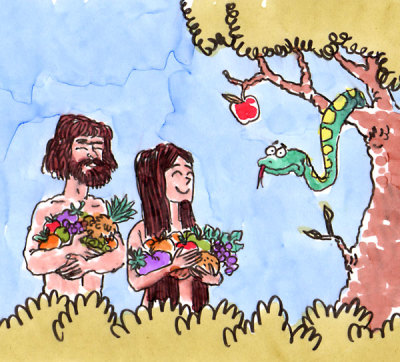Utopian socialists suffer horrible delusion (part 2)

READ: Assault on the boundaries 'chaos vs. cosmos': Our present madness (part 1)
Utopian socialism is a current passion eagerly pursued in the West, and just as passionately resisted in nations that have tried it.
Utopian socialists suffer a horrible delusion, believing that the paradise they build will be a land of no religion, the minimum of law, and highly flexible boundaries, since many believe there is no need for borders and limitations, fallen human nature having been shed and replaced with the denial of original sin.
Sadly, like Cain, who thought there would be no consequences for murdering his brother, the need for inviolable boundaries becomes just as urgent in the heart of modern idealists as it was for Cain.
Was there really a “beyond” with respect to the Garden of Eden?
After murdering his brother, Cain found out the hard way that there was indeed a “where” beyond the Eden Paradise. “Nod” was a chaotic place of hopeless wandering, a wild region where there was no regard for human life, a land so wild that Cain would have no hope for survival if God Himself did not establish a boundary in the form of a protective mark upon him.
Eden was the opposite in every way. It’s very name in Hebrew connotes a “delightful place.” To the Persian mind it suggested the idea of a royal garden, walled and secure from all enemies, and lush with growth both pleasing to the eye and nourishing to the body.
The emphasis, however, is on the fact that such a garden was safe because it was well protected by fences and other types of barriers that marked the clear limits not to be crossed.
Nevertheless, Satan detests boundaries that establish a zone where he is not in charge. The ruler of darkness searches for unbounded regions where he can establish authoritarian control. Chaos leads to the desperation that would crown even the devil if he promised to quell the madness.
Thus, the prince of darkness stormed the gates of Eden. And Lucifer’s ultimate goal is to displace Christ from the throne of the cosmos, the agent of the prince of darkness is the antichrist. “Anti,” in Greek, as in English. means “against”, but also, “in the place of.”
The spirit of chaos is thus opposition and imposition. All spiritual warfare is therefore about displacement and all displacement has to do with boundaries.
A world that has chosen evil, as Adam and Eve did in the Garden, will therefore always plunge into deepening chaos as it tears down its walls and gates that constitute its boundaries.
Thus, Eden had to have a forbidden tree. In the final analysis, the events are all about love. God loves, and therefore He makes us free. Freedom, however, mandates choice. Choice is essential because it marks the limits between cosmos and chaos. Boundary makes no sense without demarcation.
This reality is not limited to spiritual issues, but to all spheres of experience. Bio-scientist Stephen C. Meyer writes in Signature in the Cell that “founders of modern science needed to assume that if they studied nature carefully, it would reveal its secrets.” This assumption “was grounded in the Greek and Judeo-Christian idea that the universe is an orderly system — a cosmos.”
Meyer also notes the idea held by Alfred North Whitehead that “there can be no living science unless there is a widespread instinctive conviction of an Order of Things … in particular an Order of Nature.” Eden was a paradise not only because of its physical boundaries, but the spiritual, moral, institutional, territorial, and social ones as well. They are expressed in the 10 Commandments and the statutes that would arise from them. Violation would bring chaos. The boundaries that made Eden a true paradise included these:
Transcendence — “I am the Lord Your God…”
Singularity —“… no other gods.”
True Worship — “you shall not worship them.”
Reverence — “You shall not take the name of the Lord your God in vain.”
Recognition of the holy — “Remember the Sabbath day to keep it holy.”
Honor for family as God constituted it — “Honor your father and your mother.”
Respect human life — “Do not murder.”
Respect private property — “Do not steal.”
Discern and respect truth — “Do not bear false witness.”
Respect property rights — “You shall not covet.”
Those given through Moses were boundaries of law, but Jesus comes into society with a new form of border, one that gets beyond stiff legalism — the boundaries of love as He presents in the Sermon on the Mount.
To the extent that we treasure and respect the values of Law given through Moses, and the blessings of the borders of love about which Jesus taught us, we will enjoy cosmos. But to the extent we ignore them all, the deeper into Nod we will journey, stumbling over the carcass of Cane, and stepping over the jumble of lost and dead civilizations, as we journey into the dangerous, chaotic jungles of confusion.
Wallace B. Henley is a former pastor, daily newspaper editor, White House and Congressional aide. He served 18 years as a teaching pastor at Houston's Second Baptist Church. Henley is author or co-author of more than 25 books, including God and Churchill, co-authored with Sir Winston Churchill's great grandson, Jonathan Sandys. Henley's latest book is Who will rule the coming 'gods'? The looming spiritual crisis of artificial intelligence.



























